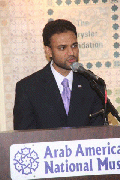DEARBORN – During President Barack Obama’s “A New Beginning” speech in Cairo, Egypt last June, he announced the United States would reach out to Muslim-majority countries by expanding partnerships with the Muslim world in areas of education, health, science and commerce.

|
| President Obama’s envoy to the OIC speaks at the American Arab National Museum on Sunday, Aug. 15. PHOTO: Nafeh AbuNab/American Elite Studios |
“It’s been a little over a year since the Cairo speech and we are making steady progress in implementing the vision and framework for a new beginning that the president outlined. We have been engaged in a broad range of efforts. We continue to work to resolve the political conflicts that have been sources of tension between the United States and Muslim communities around the world. At the same time we have begun building partnerships and planting seeds that are part of a sustained long term strategy,” Hussain said. “Our engagement of Muslim communities should not be based only on countering the security concerns from an ideology that a vast majority of Muslims reject. Our engagement must be broader. All people, whether they are Muslim or not, whether they live in a Muslim country or not, share many of the same fundamental concerns and aspirations. That is why we see partnerships in areas such as education, entrepreneurship, science, technology and health.”
U.S. Congressman John Conyers of Michigan organized the event and also served as host. Senior Judge Damon Keith of Detroit and the U.S. 6th Circuit Court of Appeals also gave remarks during the ceremony.
According to Hussain, over the past year Obama’s administration has increased exchange program funding for Muslim-majority countries by more than 30 percent and is targeting additional increases moving forward. Hussain said the U.S. supported 19 literacy programs in Iraq through a $6 million Iraq Rapid Assistance Program and has begun fostering relationships between schools and universities around the world to help develop academic collaborations. According to Hussain, the Presidential Summit on Entrepreneurship in April brought together 300 entrepreneurs from more than 50 countries. “It sought to build networking among stakeholders and entrepreneurs and provided an opportunity to excel in partnerships that advance entrepreneurship,” Hussain said. The U.S. Science Envoy Program has sent prominent U.S. scientists including Dr. Ahmed Zewail, Dr. Elias Zerhouni, and Dr. Bruce Alberts overseas to Egypt, Lebanon, Saudi Arabia, Kuwait, Qatar, Algeria, Tunisia, the United Arab Emirates and Indonesia where they have identified opportunities for new partnerships in science and technology according to Hussain. “In Cairo the president announced the new initiative to work with the OIC to eradicate polio and we’ve had tremendous successes in three OIC countries, Afghanistan, Pakistan and Nigeria,” Hussain said. The OIC is working with the World Health Organization to create national campaigns to fight the disease in all its 57 member countries.
As for interfaith partnerships, Hussain said the U.S.-Indonesia Interfaith Conference in Jakarta brought together religious leaders from eight countries who are now working on projects that will impact communities in areas of poverty eradication, environment, education, and governance.
“In the Middle East, the administration recognizes the urgency and importance of resolving the Israeli-Palestinian conflict and is absolutely committed to the overall goal of a comprehensive peace with two states living side by side. Although there may continue to be ups and downs, the president and the United States will continue to be persistent. We will not waver in seeking peace and we will not walk away from this challenge,” Hussain said.
United States Special Envoy for Middle East Peace George J. Mitchell, Jr. has been in the region on a monthly basis and engaged in the goal of moving into a direct negotiation for a two-state solution according to Hussain.
By Aug. 31, the U.S. is expected to reduce troop presence in Iraq to 50,000 from about 100,000, an initiative Hussain said is positive. Congressman John Conyers said the president shouldn’t drawdown troops. “I am trying to persuade the president to reduce our presence militarily in Afghanistan as soon as possible. Now Iraq seems to be getting more and more troublesome so I’m not too sure about reducing our presence there, because it seems to be destabilizing and the confidence in the Iraqi government among the Iraqis is not very high,” Conyers said. Imad Hamad, regional director of the American Arab Anti Discrimination Committee, said he wasn’t satisfied with Hussain’s speech because he didn’t focus enough on the controversy over the questioning of a mosque being built near Ground Zero. “I wanted Mr. Hussain to clarify the president’s position on that. I think that’s a topic people were hoping to hear about,” Hamad said. Dr. Masarrat Ali, who is running for U.S. Congress in Texas, said he is pleased with the efforts Obama’s administration has made in reaching out to the Muslim world. “We have to send a positive message that the United States really wants to extend a friendly hand to Muslim countries and I think the president has been able to give the message that we are here to extend cooperation and help them, so it’s going to be a mutually respected relationship from now on,” he said.






Leave a Reply